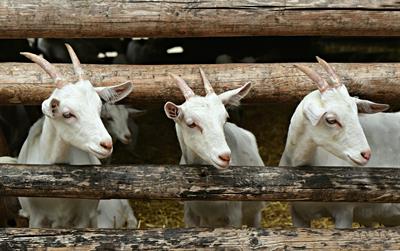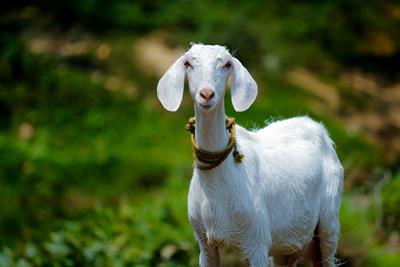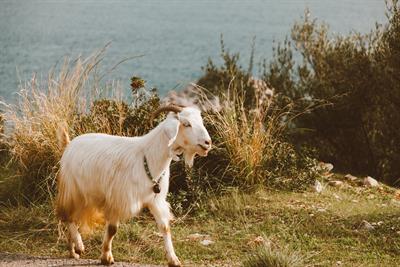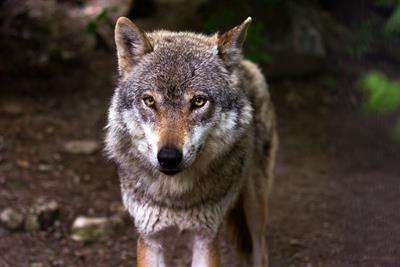PDF chapter test TRY NOW
Once, there lived an old man named Abbu Khan in Almora. Almora is not a fictional place. It is a cantonment town and municipal board in the Indian state of Uttarakhand, located on a ridge on the southern border of the Kumaon Hills in the Central Himalaya range.
Except for the few goats he kept as pets, Abbu Khan lived alone in Almora. Abbu Khan cared for his goats as if they were his children since he lived alone and only had his pets to keep him company. He'd given his goats funny names like Kalua, Moongia, and Gujri. Kah-LOO-ah is the pronunciation that means "The second kid" in the Hawaiian language, and Gujri means "a beautiful girl" in Hindi.
During the day, Abbu would take the goats out for grazing and talk to them as if they were his children. He'd then take them back to his hut at night and put a string around each goat's neck.
Except for the few goats he kept as pets, Abbu Khan lived alone in Almora. Abbu Khan cared for his goats as if they were his children since he lived alone and only had his pets to keep him company. He'd given his goats funny names like Kalua, Moongia, and Gujri. Kah-LOO-ah is the pronunciation that means "The second kid" in the Hawaiian language, and Gujri means "a beautiful girl" in Hindi.
During the day, Abbu would take the goats out for grazing and talk to them as if they were his children. He'd then take them back to his hut at night and put a string around each goat's neck.

Abbu Khan's pets
Abbu adored his goats and was always looking out for them. Despite Abbu Khan's best efforts, he was unable to keep his goats with him. The reason behind this was that one of the goats would frequently break the string at night and go up the hills, never to be seen again. Goats in hilly areas generally hate being tied to trees or poles and prefer to remain free.
Abbu adored his goats and was always looking out for them. Despite Abbu Khan's best efforts, he was unable to keep his goats with him. The reason behind this was that one of the goats would frequently break the string at night and go up the hills, never to be seen again. Goats in hilly areas generally hate being tied to trees or poles and prefer to remain free.
As Almora was a hilly region, Abbu's goats also desired to climb the hills and enjoy their freedom. Abbu Khan's goats were of the highest quality hill breed. Despite Abbu's affection for his goats, the goats opted to flee away from his hut one by one and seek shelter in the hills. And the wolf in the hills killed the goats that flew out of Abbu.
Abbu was disappointed whenever his goat went missing since he knew a hill wolf had murdered it. Though the loss of the goats saddened Abbu, he was confused as to why his goats had left his home. After all, Abbu fed his goats the finest food possible, including the freshest grass and grains. In addition, the amount of affection he showered on his goats was immeasurable.
Abbu wondered why his extraordinary care and affection for his pets (pet goats) had not prevented them from fleeing to the hills and dying. He questioned himself if the goats were insane or if it was just due to their need for freedom, which led them to flee the hut for the hills. He was still confused as to why the goats would choose freedom above the comfort and love they enjoyed at Abbu's home, especially when they were about to be slaughtered by wolves.
Abbu was not convinced as to why freedom was chosen as an important thing by the goats among the privileges it enjoyed, that too, at the cost of losing their (goats') lives. For Abbu Khan, the constant departure of goats remained a mystery, and he was puzzled for the reasons mentioned above.
The old man (Abbu Khan) was downcast after losing all of his beloved goats. After his beloved goats died, he resolved not to have any more goats as a pet. Abbu, on the other hand, was lonely after a while since he had no one to love. He also missed having a pet goat. This feeling of loneliness inspired him to get a goat one day. Because the goat he brought home was so young, he assumed it would stay with Abbu for a long time. He also assumed that she (the new goat) would begin to love him and the food he fed her. And, unlike his other goats, he decided to show it more affection and provide excellent food for it to avoid it fleeing to the hills. He was overjoyed when he arrived home with the baby goat.
Abbu wondered why his extraordinary care and affection for his pets (pet goats) had not prevented them from fleeing to the hills and dying. He questioned himself if the goats were insane or if it was just due to their need for freedom, which led them to flee the hut for the hills. He was still confused as to why the goats would choose freedom above the comfort and love they enjoyed at Abbu's home, especially when they were about to be slaughtered by wolves.
Abbu was not convinced as to why freedom was chosen as an important thing by the goats among the privileges it enjoyed, that too, at the cost of losing their (goats') lives. For Abbu Khan, the constant departure of goats remained a mystery, and he was puzzled for the reasons mentioned above.
The old man (Abbu Khan) was downcast after losing all of his beloved goats. After his beloved goats died, he resolved not to have any more goats as a pet. Abbu, on the other hand, was lonely after a while since he had no one to love. He also missed having a pet goat. This feeling of loneliness inspired him to get a goat one day. Because the goat he brought home was so young, he assumed it would stay with Abbu for a long time. He also assumed that she (the new goat) would begin to love him and the food he fed her. And, unlike his other goats, he decided to show it more affection and provide excellent food for it to avoid it fleeing to the hills. He was overjoyed when he arrived home with the baby goat.
The new goat was extremely appealing and beautiful. It was as white as snow, with two small horns on her head and a pair of dazzling red eyes. She had a pleasant, friendly temperament and listened to Abbu Khan's stories with great attention and fondness. Abbu Khan gave her the nickname Chandni, which means "moonlight." He adored Chandni and used to tell her about all of his friends (goats Abbu had before Chandni) who had died.

Chandni
Chandni remained with Abbu for several years. It adored Abbu just as much as he adored Chandni. Chandni's nature led Abbu to assume that, unlike his previous goats, Chandni would not leave Abbu's compound and head to the hills. "Alas! he was mistaken again." This sentence in the paragraph appears to be a clue to the readers that Chandni's temperament was about to change.
Abbu Khan underestimated Chandni. As Chandni grew older, she had a strong desire to climb the hills and breathe in the fresh air like any other hill goat. Every morning, she began to gaze at the sun-drenched hilltops and marvel at their beauty. The cool wind from the hills struck her about how lovely it would be to run through the fields. The rope around her neck, on the other hand, would prevent her from fleeing. She became irritated with the rope that held her captive.

Sunrise on the Hills
As a result, she stopped eating grass and did not pay attention to Abbu Khan's stories. She grew extremely thin as a result of skipping meals, yet she would spend the whole day staring at the hills, wishing she could go there. Abbu Khan had no idea what Chandni's problem was or why she was acting so oddly.
As a result, she stopped eating grass and did not pay attention to Abbu Khan's stories. She grew extremely thin as a result of skipping meals, yet she would spend the whole day staring at the hills, wishing she could go there. Abbu Khan had no idea what Chandni's problem was or why she was acting so oddly.

Green Hills
Finally, Chandni decided to confront Abbu Khan about her problems. Chandni told Abbu Khan about her problem. She begged Abbu to let her go up the hills because she was afraid that she would die if she didn't breathe the air of freedom. Abbu Khan recognised Chandni's problem and the reasons for her strange behaviour when Chandni spoke with him.
Despite the fact that he understood Chandni's predicament, he felt miserable and helpless since he knew that letting her go up the hills would only make things worse for her. Listening to Chandni's desire, he dropped Chandni's breakfast pot from his grip. It (the pot), like Abbu Khan's heart, was shattered into a thousand pieces.
Finally, Chandni decided to confront Abbu Khan about her problems. Chandni told Abbu Khan about her problem. She begged Abbu to let her go up the hills because she was afraid that she would die if she didn't breathe the air of freedom. Abbu Khan recognised Chandni's problem and the reasons for her strange behaviour when Chandni spoke with him.
Despite the fact that he understood Chandni's predicament, he felt miserable and helpless since he knew that letting her go up the hills would only make things worse for her. Listening to Chandni's desire, he dropped Chandni's breakfast pot from his grip. It (the pot), like Abbu Khan's heart, was shattered into a thousand pieces.
Abbu Khan couldn't understand why Chandni wanted to leave Abbu's house, despite the privileges and delicious meals she enjoyed. Abbu adored her more than anything else in his life. Abbu Khan was confused as to why the goats wanted to travel to the hills.
The goats, after all, were well aware that going up the hills could prove fatal. Abbu Khan questioned Chandni about the cause of her desire to visit the highlands. She remained silent. "I want to go to the hills," she said. Her wish to go to the hills was the reply to Abbu Khan's query. He asked whether she disliked the meal served at Abbu's house. He also promised her more delicious meals as well as a much longer string. Despite this, he did not receive a good response.
Chandni turned down Abbu's offer and insisted on going up the hills. Abbu Khan made every effort to convince her of the difficulty of ascending the mountain. He warned her about the dangerous wolf that may attack her if she went up to the hills. Despite Abbu's warnings, Chandni was adamant about going to the mountains, telling Abbu that she would fight the wolf with her horns.
When Abbu heard such a response from Chandni that she would fight back the wolf, he was taken aback. He had no clue why Chandni said that even after knowing what had happened to Kalua. He told her about his deer-sized goat, Kalua, who fought the wolf all night until being killed the next morning. Abbu Khan told about Kalua for the fiftieth time to Chandni.
Despite Abbu's warnings about the dangers of going up to the hills and his story of dead goats, she remained firm in her decision. “I want to go to the hills,” was her sole response to Abbu. Abbu was enraged when he heard Chandni's answers.
He yelled at Chandni and confined her to a small hut, fearful of allowing her to roam freely around the compound wall. Abbu considered Chandni to be ungrateful as she was showered with love and protected with more care by Abbu. Still, when Chandni wanted to enjoy her freedom, he pointed out that she was ungrateful. Yet, Abbu's love for Chandni made him take initiative in saving her life. Still, he forgot to close the hut's window. Chandni had used the hut's window to escape from Abbu's place. Despite Abbu's pleas and warnings, Chandni made her flee towards the hill.
Chandni ran toward the hill after she escaped through the hut's window. Finally, she reached the hills; she finally achieved her freedom and was breathing in the fresh air of the hills. And, the hills appeared to be standing up to greet her. It was like she had met her parents after a long time.

Chandni reached the hills
She felt like a child seeing her parents again after many years of separation. Wherever Chandni walked, she felt like the long grass was surrounding her, flowers blooming to delight her, and the breeze singing an everlasting welcoming melody for her. The grass, flowers, and mountains all appeared to be beckoning her to venture into the hills. She relished her freedom in the hills. She then started comparing the beauty of the hills and her freedom to Abbu's place, as she felt terrible about being imprisoned in Abbu's home. Chandni felt it was the most fantastic day of her life, and she felt like the world's happiest goat.
Chandni was overjoyed with the achievement of a long-held dream. She continued to play for hours on end on the limitless expanse of green-grassed hills. She also respectfully refused to join the herd of wild goats who approached her and invited her to join them. She desired to enjoy her freedom on her own. After a while, evening fell, and the hills were shrouded in darkness.
A weird sound came from the bushes, and there was silence all around the hills. From the bushes, a grunting voice was heard. Chandni was able to discern one thing: it was neither Abbu Khan's nor any other goat's voice. Chandni then connected the voice she heard to Abbu Khan's tale. Abbu Khan's stories of dead goats and his warnings about the deadly old wolf that resided in the hills came to Chandni's mind. Chandni was terrified.
Chandni recognised the sound as that of a wolf. She considered returning to Abbu Khan's hut at one point, but then came to realise that 'death on an open field is far preferable than life in a small hut (Abbu Khan's place)'. She was determined that she would not leave the hills, even if it results in her death. The terrifying, greedy wolf suddenly appeared in front of Chandni. As the wolf gazed at Chandni, its eyes twinkled like flaming coals, and it didn't appear to be in any hurry, as though the predator (wolf) was certain that it would catch its prey (Chandni).

The ferocious wolf
The wolf and Chandni sized up each other. The goat was small though it looked healthy in comparison to the wolf, which was enormous and ferocious. Smallness, on the other hand, does not indicate a lack of strength. Chandni did not consider herself to be weak; despite her small size, she did not leave the battle and was prepared to fight like a real, courageous soldier against the deadly wolf with all her might. She was determined to keep her freedom. So Chandni was resolved to fight with all her might, believing that success or failure was a question of luck or chance.
Then the fight began between Chandni and the wolf, and it went on throughout the night. The moon turned pale, and the stars disappeared one by one. A faint light appeared in the east. Then the sound of the morning prayer came from a distant mosque. The first rays of the sun saw Chandni lying dead on the grass, completely soaked in blood. The wolf looked tired and sleepy and was ready to devour its killed prey.
A group of birds that had watched the fight between wolf and Chandni had a debate among themselves about the fight's result. One of them asked who the winner was, and most of them answered the wolf. But, one of the wiser birds declaimed with confidence that "Chandni was the winner." Because the wise bird knew, Chandni fought for her freedom bravely till her last breath, despite being not as mighty as the ferocious wolf.
Despite the fact that Chandni knew it had a slight chance of defeating the powerful wolf, it decided to fight nonetheless because it loved its freedom more than its life and fought to defend it. If Chandni had returned to Abbu's house, it could have been spared, but it did not. Chandni was adamant about fighting, despite the fact that she was no match for the enormous wolf. Chandni was the genuine winner since she held her choice to battle the wolf and died in the hills rather than being imprisoned at Abbu's house to the end.
